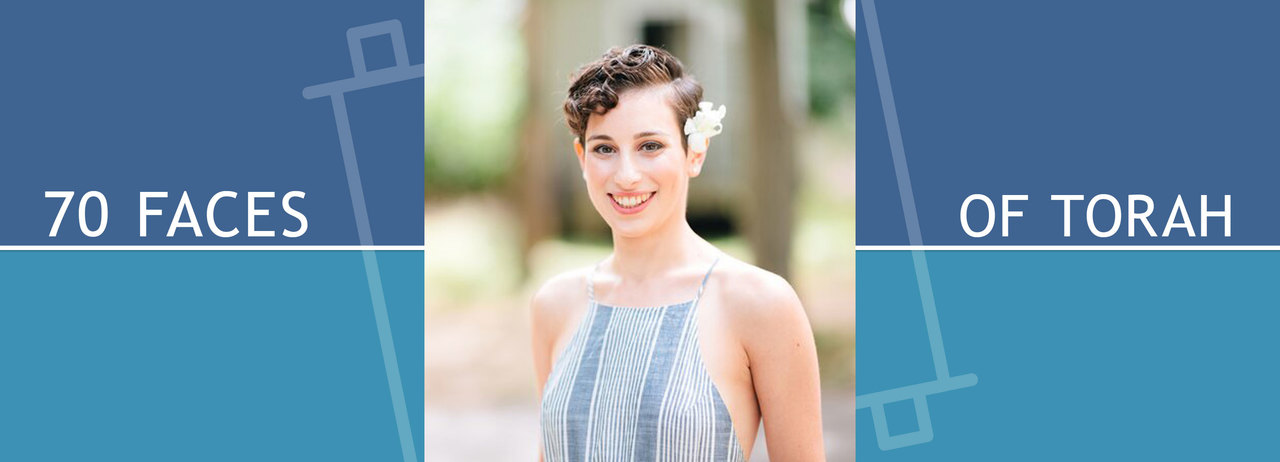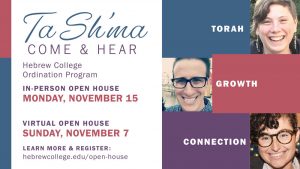Genesis The Languages We Speak

Parashat Vayetze (Genesis 28:10-32:3)
As I write, I am in Jerusalem, studying during my third year of rabbinical school. Each day here I am reminded of how much I love the way Hebrew feels on my tongue, how much joy I derive from using Hebrew to talk about both the most mundane and the most meaningful experiences of life. Speaking in Hebrew makes me feel proud, like I belong here. And each day, as I take the bus, shop at the grocery store, and walk the streets, I am reminded that the words I use to talk about anything—and the language I use to say those words—matters, especially here. My ability to speak Hebrew, in addition to being a white Jew of Ashkenazi descent, gives me a particular privilege in Israel, one that not everyone shares.
Another (and very different) privilege that I have here is the privilege of being a rabbinical student, which means that I have access to incredible programming and educational opportunities specifically targeted at rabbinical students. Two weeks ago, I had the fortune of attending a T’ruah event with two performers from Beit System Ali, an arts and educational organization that uses the power of language and music for activism. Band members rap in many languages, including Arabic, Russian, Yiddish, English, and Hebrew. In educational workshops, they teach students how to write, collaborate, and create music in their own native languages.
Our teaching artists at the T’ruah workshop told stories of students prohibited from speaking languages like Russian and Arabic at school, and they shared with us the way that their work encourages the students they teach to reclaim their own languages and identities. System Ali’s performances and community-based work create environments in which “the encounter and confrontation between different languages, stories, and identities” is a source of learning and inspiration for social change. Their work reminds us that words have power. The language that we choose to speak—or are allowed to speak—itself speaks stories.
At the end of this week’s parasha, Vayetze, the significance of language takes center stage. Jacob is on the run, yet again, this time from his father-in-law, Laban. After 20 years of service to Laban, which includes two marriages and multiple children, Jacob has packed up his family and his flocks and fled. Laban catches up with Jacob and they argue. Laban is furious at Jacob for running away without letting Laban say goodbye to his children and grandchildren. Jacob defends himself and accuses Laban of changing his wages over and over again. Finally, they decide to make a covenant, a brit. The Torah teaches:
Thereupon Jacob took a stone and set it up as a pillar.
And Jacob said to his kinsmen, “Gather stones.” So they took stones and made a mound; and they partook of a meal there by the mound.
Laban named it Yegar-sahadutha, but Jacob named it Gal-ed.
(Genesis 31:45-47)
The covenant begins with Jacob and Laban building a monument and sharing a meal together. But then the text takes a different turn as the two men name the site. Laban calls it Yegar-sahadutha. Jacob calls it Gal-ed. Two totally different names.
Why the multiple names? After all, they are supposed to be making a covenant— shouldn’t they at least be able to agree on the name of the place? Yegar-sahadutha. Gal-ed. It seems as if they are not communicating. How is this covenant supposed to work if they can’t even agree? Perhaps their 20 years of distrust continues even here, as they try to outdo the other with their words.
It turns out, however, that what they are saying is actually the same thing, but in two different languages. Gal-ed is the Hebrew word for “Mound of Witness.” Yegar-sahadutha is the Aramaic for “Mound of Witness.” Two languages, two names, one shared meaning to describe the act of building a place to witness a new moment in their relationship. This brit will allow them to move forward in their lives, simultaneously together and away from each other.
It’s beautiful, even inspiring, to see Jacob and Laban come together despite their pain and anger and for us as readers to see them agreeing through their bilingual naming. But do Jacob and Laban know that they are using the same name for this place? I’d like to think that they do. I like to think that it is this moment that truly begins the process of them honoring each others’ differences. They implicitly recognize that choosing the same name in the same language would erase something about the other. Only one person would win. And this is a covenant, a moment of holy reconciliation. They each contribute a name to the place, and thereby they each contribute a piece of themselves. No one wins, but no one loses either. They realize that they do not have to speak the same language—they don’t even have to share the same space—but they can respect each other. The multiplicity of languages in the story makes the covenant that much more meaningful and more lasting.
May Laban and Jacob’s covenant at Yegar-sahadutha/Gal-Ed remind us of the simple privilege we have to speak and to be understood. May it inspire us to jump into opportunities to learn, to speak, and to reclaim our own historical languages—whether Hebrew or Aramaic, Yiddish or Arabic, Ladino or Amharic—and languages that we may not yet feel connected to. May we celebrate the languages that we grow up speaking, and the stories those languages tell about ourselves, our families, and our journeys. And as Jacob and Laban recognize each other’s names for the Mound of Witness, may we too recognize the many names our Holy Land is and has been called, as well as the many names of the places within it. And may we also learn to recognize when the languages we speak may be drowning out the languages, voices, and stories of those we do not know or yet know how to listen to. Let us listen, even when we don’t fully understand. We may be surprised. We may even be saying—and wanting—the same thing.
Leah Carnow (she/her) is a rabbinical student in her third year of school at Hebrew College. Originally from Los Angeles, Leah has lived in the Boston area for over 10 years, where she has worked as a yoga teacher, actor, director, healthcare professional, and Jewish educator. Last year, she served as the rabbinic intern at Temple Sinai in Brookline. Leah is currently studying in Jerusalem.
Want to learn more about our rabbinical program?


